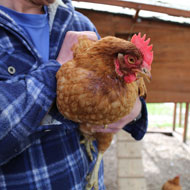
A charity in Watford has rehomed four commercial hens, in an effort to provide comfort for those suffering from mental illness, drug and alcohol addiction and homelessness.
New Hope was founded 27 years ago with the aim of providing help and support to vulnerable individuals, guiding them through their recovery and offering a sense of wellbeing via their community market garden. In August 2015, the charity adopted four hens - Hope, Henrietta, Hatti and Harriet - from the British Hen Welfare Trust.
The hens are referred to as ‘the girls’ and have been effective in bringing people together and encouraging them to communicate, through the mutual connection of caring for the animals.
Ian Bond, community market garden supervisor, said: “They have been loved and cared for warmly by our service users, been the subject of a poem written during one of our poetry sessions and have been used as a way of encouraging wider engagement for our gardening workshops for those not drawn to gardening but who have a love for animals.
“Our girls are very well loved by almost everyone who spends time at the garden. As well as providing opportunities for nurturing and care, they offer a lightness and relief from the traumas of homelessness, substance abuse and mental ill health. They also provide a means of making us a closer team by helping service users, who are often nervous of others, to interact with each other through a common interest.
“The hens - as they go about their days, weathering the winter, always happy for a bit of sunlight and the chance to have a dust bath - provide a reassuring presence which encourages expressions of love, something vitally important for the healing journey of recovery.”
According to Ian, many of the people staying with New Hope find the hens amusing and will often sit and chat to the hens, when they’re alone.
For more information about giving a happy home to hens, visit www.bhwt.org.uk
Image courtesy of the British Hen Welfare Trust



 The Veterinary Medicines Directorate (VMD) is inviting applications from veterinary students to attend a one-week extramural studies (EMS) placement in July 2026.
The Veterinary Medicines Directorate (VMD) is inviting applications from veterinary students to attend a one-week extramural studies (EMS) placement in July 2026.